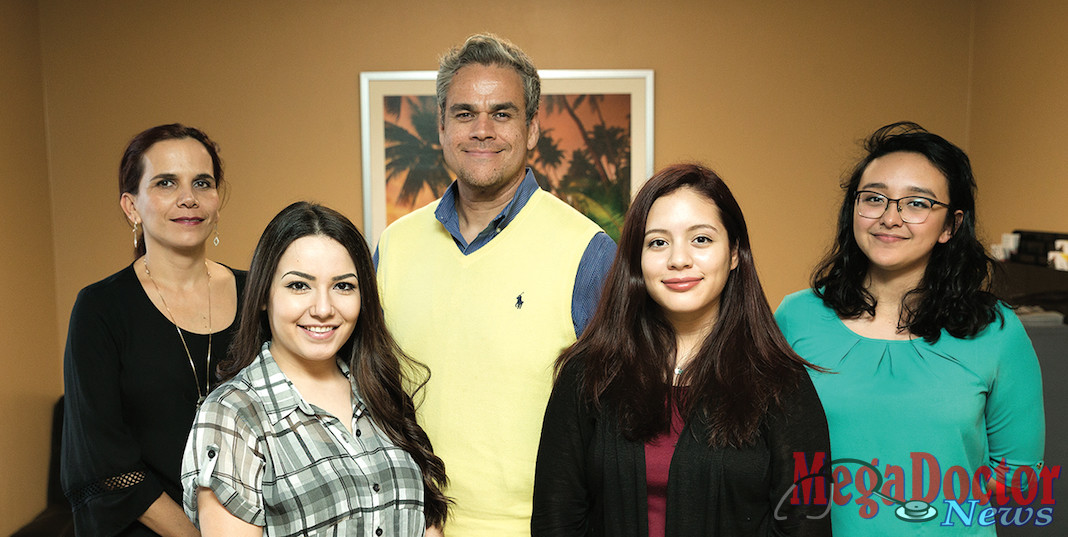
By Gail Fagan
Mega Doctor News –
Rio Grande Valley, Texas – Improving mental healthcare for Rio Grande Valley residents drives the work of Dr. Alfonso Mercado, a licensed psychologist and assistant professor of psychology at The University of Texas Rio Grande Valley.
Mercado, who was elected recently to the Board of Trustees for the Texas Psychological Association, says mental healthcare in the Rio Grande Valley is in crisis. The national standard for psychological treatment is one psychologist per 10,000 people; the Valley falls far short of that, he says.
“Right now, we are needing 100 of them to meet that standard,” he said. “Due to the lack of qualified professionals in South Texas, many individuals with mental illnesses are not identified. Most receive inadequate, or even no treatment.”
With that in mind, Mercado has directed his latest research to documenting the effectiveness of Dialectical Behavior Therapy (DBT) within the Latino population. DBT is first-line treatment for Borderline Personality Disorder and other complex clinical disorders, DBT USE/RESEARCH: Benefits for the patient DBT, first conceived by Dr. Marsha Linehan in the late 1980s, is a structured therapeutic program that focuses on emotional regulation, stress tolerance, interpersonal effectiveness and mindfulness and meditation.
“Its effectiveness is well-documented through empirically validated research, but there is a lack of evidence supporting this approach with culturally diverse groups,” said Mercado, who currently is the only DBT provider in the Valley, other than the Veterans Administration.
Last fall 2016 semester, Mercado instituted a free 17-week, specialized, Spanish-language DBT skills group project at Tropical Texas Behavioral Health.
The 17-week program contributes to efficacy research with ethnic minority groups, he said, and explores whether or not DBT as currently structured is effective with Latino populations or if cultural adaptations are warranted. The research includes pre- and post-testing, as well as comparisons with a control group undergoing treatment without DBT.
Mercado’s student researchers have been able to learn the basics of DBT and how to use this therapeutic method in a clinical setting with mentally ill patients. In fall 2016, several of his students participated in a poster presentation on a case study supporting DBT’s effectiveness at the “Mindscape: Behavioral Health Today” conference for healthcare professionals at South Padre Island hosted by Texas Tropical Behavioral Health.
When the UTRGV School of Medicine’s first psychiatry residents begin in June 2017, Mercado will train them in psychotherapy.
He also looks forward to the initiation at UTRGV of a doctoral program in clinical psychology, currently under consideration, that will result in the production of more clinical psychologists who will remain in the community.
NEXT RESEARCH: Trauma’s effect on immigrant health
Mercado also has a drive to investigate new questions regarding the Hispanic Health Paradox – a phenomenon found by earlier researchers in which Latinos in the United States are less likely to suffer from chronic disease or die prematurely than non-Hispanic whites, despite high rates of poverty and less access to education and healthcare.
In fall 2016, Mercado submitted a funding proposal with a faculty colleague at Sam Houston University to test the role of sociocultural resilience for this health advantage, including the collectivist values of family, interpersonal harmony and valuing of elder community members common in the Hispanic culture. However, his research will focus on recent Central American immigrant mothers and their children, and the potential role of trauma in the health of those fleeing unprecedented increases in violence in Central America.
“We have the perfect population to do this kind of research, with brand new individuals who have just crossed the border,” Mercado said. “This study is the first to include psychological factors (i.e., trauma) in a sociocultural model of the Hispanic Health Paradox, providing first data on how worsening conditions in Central America may thwart the Hispanic health advantage through the psychological mechanism of trauma.” MDN








